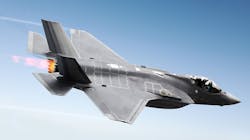Engine Repair Issue Limiting F-35 Fighter Service
The F-35 Joint Strike Fighter will be less visible to the public in the coming months: the U.S. Air Force has reduced the number of air show appearances for the high-profile jet, as a maintenance and supply chain issues limit the number of aircraft available for service. Published reports indicate that a shortage of Pratt & Whitney F-135 engines has developed for the USAF, due to extended repair times.
One previously unreported engine issue involves high-pressure turbine engine blade coatings.
As reported, engines on USAF F-35As have been running close to their design limits, leading to premature cracking for turbine blade coatings. The cracking does not constitute a safety concern, according to sources, but it has reduced the service life of the F-135 engines, and now the availability of the fighter jets while the engines are being repaired.
A Bloomberg News report detailed that a Pratt & Whitney “hardware modification” was implemented in F-135 production and maintenance programs during 2020.
Reportedly, the U.S. Dept. of Defense F-35 program office has estimated a worst-case scenario in which ongoing repairs leave up to 20% of USAF F-35s with no engines by 2025.
"The leadership team here is focused on a comprehensive recovery plan to mitigate the readiness impact to our F-35 operational units," Pentagon spokesman John Kirby was quoted by Military.com.
The F-35 is a single-engine, Stealth-enabled aircraft designed for deployment for ground attack and combat, and available in three variants: F-35A, for conventional takeoff and landing (CTOL); F-35B, for short take-off and vertical-landing (STOVL); and the F-35C carrier-based variant for Catapult Assisted Take-Off But Arrested Recovery (CATOBAR) variant.
All three models incorporate the F-135 after-burning turbofan engine.
The USAF’s F-35 demonstration team usually appears at about 20 air shows per year, though the COVID-19 pandemic shortened the 2020 schedule of appearances.
